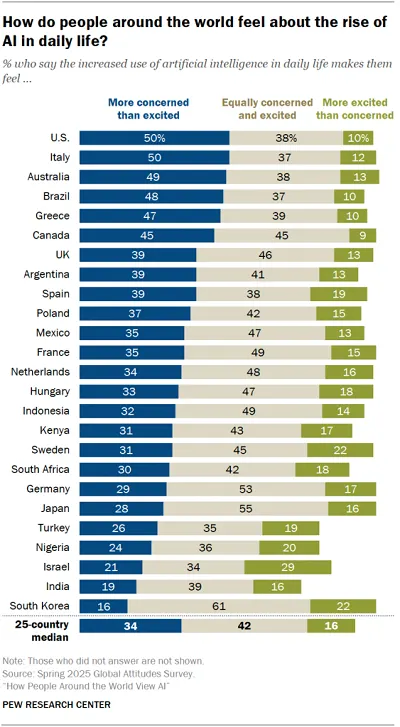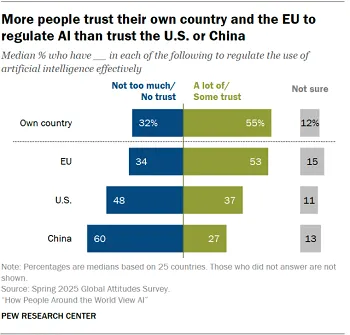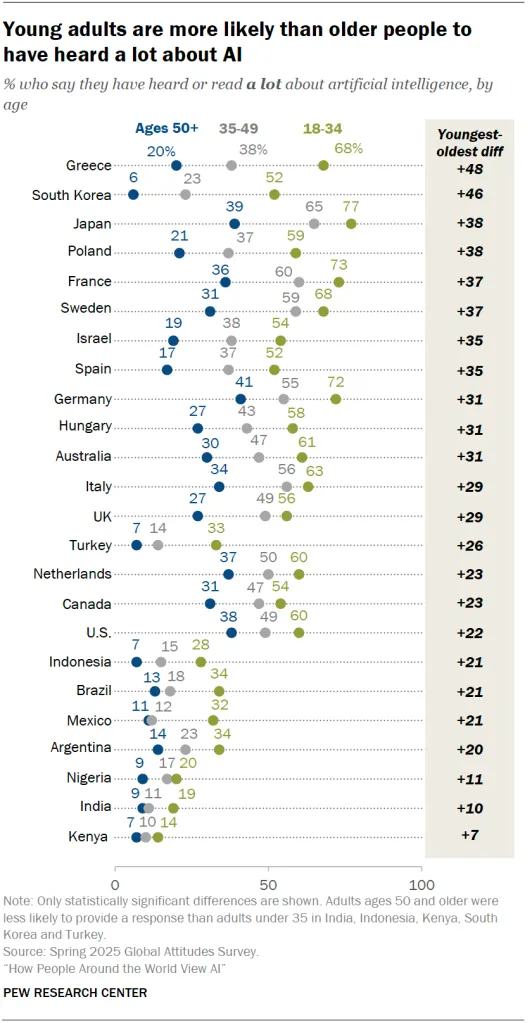Fresh Reports Expose Deepening Global Anxiety Over Artificial Intelligence
 Adshine.pro10/16/20252 views
Adshine.pro10/16/20252 viewsWhile major tech companies continue to flood the market with new AI tools—touting their transformative potential and productivity gains—public sentiment remains mixed, with many consumers still uneasy about the long-term implications of artificial intelligence.
That’s the takeaway from new research by Pew, which surveyed global audiences to better understand how people perceive AI’s growing presence in everyday life—and how much trust they place in governments to regulate it effectively.

According to Pew’s latest findings, concerns about AI’s impact are particularly pronounced in certain regions:
“Concerns about AI are especially common in the United States, Italy, Australia, Brazil and Greece, where about half of adults say they are more concerned than excited. But as few as 16% in South Korea are mainly concerned about the prospect of AI in their lives.”
This disparity could, in part, reflect how deeply AI has been integrated into daily routines in each country. Regions with broader AI deployment appear to experience higher levels of anxiety—perhaps because their populations have already begun to see the social and professional disruptions that come with it.
After all, headlines warning that AI could replace millions of jobs have become routine. Studies are also beginning to flag social risks, including the decline of genuine human interaction and the growing phenomenon of people forming emotional or even romantic attachments to AI chatbots—an unsettling development, particularly among teens.
At its core, the unease stems from one simple fact: we don’t yet understand the full consequences of increasing AI dependence. And as those uncertainties multiply, so does public demand for stronger safeguards.
The logical solution, of course, is effective regulation—ensuring AI systems cannot be misused or cause harm. Yet this is easier said than done. Policymakers are trying to govern a technology that is evolving faster than any regulatory framework can adapt to.
Pew’s data also shows a widening trust gap between citizens and their governments when it comes to managing AI risks.
While most regions still express moderate confidence in their leaders’ ability to regulate AI responsibly, trust is notably lower in the United States and China—the two countries driving the AI arms race.
That’s hardly surprising. Both nations are pushing for rapid innovation, each wary that the other might seize a competitive advantage if too many safety measures are imposed. But that race to outpace one another has a cost: public confidence in oversight is eroding.
The open release of increasingly advanced AI systems has already sparked a wave of controversy—from copyright violations and intellectual property theft to deepfake misrepresentation and data privacy breaches.
The situation feels reminiscent of the early social media era: governments moved too slowly to regulate platforms like Facebook and Twitter, only realizing the extent of their negative impacts once misinformation, polarization, and mental health issues were already rampant.
The fear now is that AI will follow the same trajectory, with regulators once again playing catch-up after the damage has been done.

Interestingly, Pew’s demographic breakdown highlights a clear generational divide in AI awareness and usage.
Younger respondents are far more familiar with AI tools, and many have already woven them into their daily lives—whether for school, creative projects, or professional productivity. This younger cohort’s comfort with AI ensures that the technology’s influence will only continue to grow, regardless of older generations’ skepticism.
That creates a unique tension: the group most enthusiastic about AI is also the one most exposed to its long-term societal effects.

In the end, it’s hard to see how the world could meaningfully slow down AI’s expansion. With tech giants investing billions into AI research and governments eager to fuel innovation by cutting red tape, the momentum is firmly in motion.
And while ethical oversight and safety regulations are being drafted in parallel, the pace of real-world deployment seems to be outstripping the safeguards being put in place.
The result? A technological revolution unfolding faster than society can fully comprehend it—one that may define not only the future of work and creativity, but the very nature of human connection itself.
📢 If you're interested in Facebook Ads Account, don't hesitate to connect with us!
🔹 https://linktr.ee/Adshinepro
💬 We're always ready to assist you!